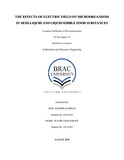The effects of electric field on microorganisms in semi-liquid and liquid edible food substances
Abstract
Pulsed electric field (PEF) is a new, emerging and a non thermal method of processing of food preservation technique, which uses pulsating electric field for the inactivation of microorganisms. The process causes a minimal effect on food quality characteristics such as smell, taste, color and texture. PEF can be especially used for processing liquid and semi-liquid edible food substances. Studies conducted on the energy requirements have concluded that PEF is an energy efficient process compared to the traditional thermal methods such as pasteurization. In this study the PEF was applied to various edible food items: raw milk, fruit juice, sugarcane extract and tap water. High energy electric field, ranging from 400 V/cm up to 1600 V/cm of frequency 50 Hz was applied and the corresponding microbial colony growth was counted. Here effectiveness of the AC field against the DC field was also compared; the impact of number of pulses applied and effect of thickness of the metal plates on the growth of the microorganisms were studied. The experimental results are encouraging and are supportive of the applied technique.

